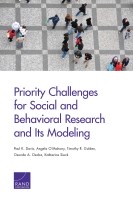| 来源类型 | Research Reports
|
| 规范类型 | 报告
|
| DOI | https://doi.org/10.7249/RR2208
|
| ISBN | 9780833099952
|
| 来源ID | RR-2208-DARPA
|
| Priority Challenges for Social and Behavioral Research and Its Modeling |
| Paul K. Davis; Angela O'Mahony; Timothy R. Gulden; Osonde A. Osoba; Katharine Sieck
|
| 发表日期 | 2018
|
| 出版年 | 2018
|
| 页码 | 186
|
| 语种 | 英语
|
| 结论 |
Social-Behavioral (SB) Modeling Is Famously Hard but Has Great Potential- For SB modeling to achieve its potential, great advances are needed in understanding the states of complex adaptive systems and recognizing when interventions are and are not controllable.
- Many SB issues are so-called wicked problems with no a priori solutions. If they are found at all, solutions must emerge from human interactions.
- The very nature of social systems is structurally dynamic, so structure changes may emerge after interactions and events, which complicates modeling.
- Obstacles to progress include disciplinary norms, mindsets, and some discrete scientific challenges, including out-of-kilter relationships among theory development, empiricism, and computational exploration.
- Another obstacle is the need to rethink how social-behavioral models can be best used to aid decisionmaking. Given inherent uncertainties, emphasis should change from efforts to predict outcomes toward efforts to anticipate and understand possible outcomes and ways to improve the likelihood of desirable outcomes (perhaps with adaptations). This will include understanding when interventions are likely to be uncontrollable and perhaps counterproductive.
|
| 摘要 |
Investment priorities should be in six groups:
- Improving the research cycle by tightening links among theory, modeling, and experimentation
- Seeking more unifying and coherent theories while retaining alternative perspectives and confronting multidimensional uncertainty
- Invigorating experimentation with modern data sources and emphasis on theory-observation iteration
- Modernizing ways to use social-behavioral models for analysis to aid decisionmaking, in particular by drawing on lessons learned from other domains about using models to assist planning under deep uncertainty
- Challenging theorists and technologists to provide related methods and tools, since existing ones are inadequate and often counterproductive
- Nurturing the rest of the ecology needed (notably infrastructure, governance, and culture), and doing so in a way that adheres to the highest standards with regard to ethics, privacy, and responsible use of model-based analysis to inform policy decisions that may have profound effects
A mechanism for addressing the priorities should be able to identify a small number of grand challenges and, for each, to organize multiyear research using virtual social-behavioral modeling laboratories to stimulate cross-cutting, interdisciplinary, iconoclastic research addressing challenges in all of the six groups.
|
| 主题 | Analytic Gaming
; Complex Systems Analysis
; Exploratory Modeling
; Robust Decision Making
|
| URL | https://www.rand.org/pubs/research_reports/RR2208.html
|
| 来源智库 | RAND Corporation (United States)
|
| 引用统计 |
|
| 资源类型 | 智库出版物
|
| 条目标识符 | http://119.78.100.153/handle/2XGU8XDN/108766
|
推荐引用方式
GB/T 7714 |
Paul K. Davis,Angela O'Mahony,Timothy R. Gulden,et al. Priority Challenges for Social and Behavioral Research and Its Modeling. 2018.
|
|
文件名:
|
x1526655672249.jpg
|
|
格式:
|
JPEG
|

|
文件名:
|
RAND_RR2208.pdf
|
|
格式:
|
Adobe PDF
|
除非特别说明,本系统中所有内容都受版权保护,并保留所有权利。